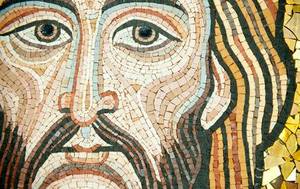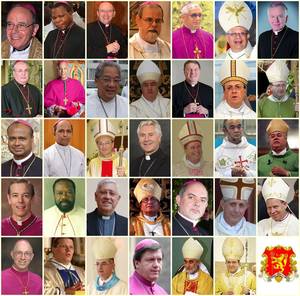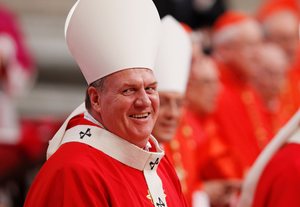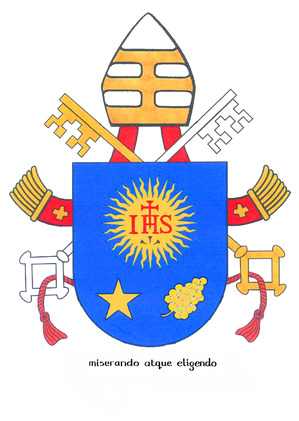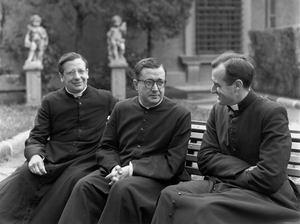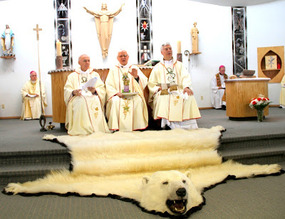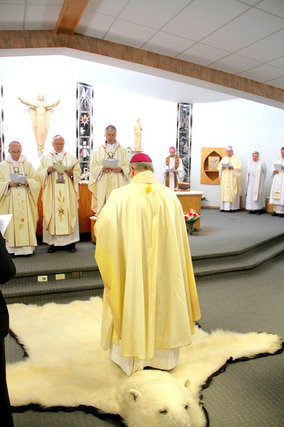Saint Hilary of Poitiers: “He who said ‘I have come not to do my own will but the will of him who sent me’ hastened to fulfill the task he had undertaken out of obedience, though in such a way as to remind us that he possessed a will of his own. In fact, he willed whatever the Father willed. His saying ‘I have come not to do my own will but the will of him who sent me’ revealed who had sent him and whom he obeyed, but without detriment to his own power of willing. Desiring to do everything the Father desired, Christ hastened to carry out his wishes with regard to his passion before the wicked could hinder him or prevent his doing so. He had a great longing to eat the Passover with his disciples, and he celebrated the paschal meal in haste. He had an intense desire to drink the cup of his passion, for he said: ‘Shall I not drink the cup which my Father has given me?’ When the search party came to arrest him and asked which man was Jesus, he stepped forward of his own accord. He asked for the sour wine which he knew he was destined to drink, and having drunk it and achieved his great purpose he said: ‘It is accomplished’, thus expressing his joy at obtaining his heart’s desire.”
Glastonbury Abbey monks elect new abbot, Fr Thomas O’Connor
 Today, the monastic chapter (the solemnly professed monks) of Glastonbury Abbey (Hingham, MA) met to elect the third abbot of the abbey.
Today, the monastic chapter (the solemnly professed monks) of Glastonbury Abbey (Hingham, MA) met to elect the third abbot of the abbey.
Remembering the Church of Rome
May God grant us to achieve as soon as possible the full unity of all believers in Christ. May we obtain this gift through the Apostles Peter and Paul, who are remembered by the church of Rome this day that commemorates their martyrdom and therefore their birth to life in God. For the sake of the Gospel they accepted suffering and death, and sharers in the Lord’s resurrection. Their faith, confirmed by martyrdom is the same faith as that of Mary, mother of believers, of the Apostles and of the saints of every age.
Blessed John Paul II
Solemnity of Saints Peter and Paul
Today is a perfect day to pray for the Pope and our bishop. It is also a perfect day to pray for Christian unity and to pick up a good book on the Church’s history. Perhaps even pray with Matthew 16.
Grant, we pray, O Lord our God, that we may be sustained by the intercession of the blessed Apostles Peter and Paul, that, as through them you gave your Church the foundations of her heavenly office, so through them you may help her to eternal salvation.
From a sermon by Saint Augustine, bishop
The martyrs realized what they taught
This day has been made holy by the passion of the blessed apostles Peter and Paul. We are, therefore, not talking about some obscure martyrs. For their voice has gone forth to all the world, and to the ends of the earth their message. These martyrs realized what they taught: they pursued justice, they confessed the truth, they died for it.
Saint Peter, the first of the apostles and a fervent lover of Christ, merited to hear these words: I say to you that you are Peter, for he had said: You are the Christ, the Son of the living God. Then Christ said: And I say to you that you are Peter, and on this rock I will build my Church. On this rock I will build the faith that you now confess, and on your words: You are the Christ, the Son of the living God, I will build my Church. For you are Peter, and the name Peter comes from petra, the word for “rock,” and not vice versa. “Peter” comes, therefore, from petra, just as “Christian” comes from Christ.
35 metropolitan archbishops receive pallium from Pope
Earlier today in Rome, Pope Francis bestowed the sign of communion between himself and the metropolitan archbishops appointed in the previous year. 35 metropolitans received the pallium today on the solemnity of Saints Peter and Paul. The Vietnamese archbishop could not go to Rome so his pallium will be given in Vietnam. 25 of the metropolitans were Benedict XVI appointees.
An excerpt of Pope Francis’ homily:
As a point of comparison, sacraments are to take place during a Eucharistic celebration following the homily; They are: Baptism, Confirmation, Ordination, Matrimony, Anointing of the Sick.The pallium is a symbol of communion with the Successor of Peter, “the lasting and visible source and foundation of the unity both of faith and of communion” (Lumen Gentium, 18). And your presence today, dear brothers, is the sign that the Church’s communion does not mean uniformity. The Second Vatican Council, in speaking of the hierarchical structure of the Church, states that the Lord “established the apostles as college or permanent assembly, at the head of which he placed Peter, chosen from their number” (ibid., 19). To confirm in unity: the Synod of Bishops, in harmony with the primate. Let us go forward on the path of synodality, and grow in harmony with the service of the primacy. And the Council continues, “this college, in so far as it is composed of many members, is the expression of the variety and universality of the people of God” (ibid., 22). In the Church, variety, which is itself a great treasure, is always grounded in the harmony of unity, like a great mosaic in which every small piece joins with others as part of God’s one great plan. This should inspire us to work always to overcome every conflict which wounds the body of the Church. United in our differences: there is no other Catholic way to be united. This is the Catholic spirit, the Christian spirit: to be united in our differences. This is the way of Jesus! The pallium, while being a sign of communion with the Bishop of Rome and with the universal church, with the Synod of Bishops, also commits each of you to being a servant of communion.
Among some of the 19 countries represented:
1 from Vietnam
3 from Africa
3 from Brazil
3 from India
3 from Mexico
4 from the USA
5 from South America
The rite today followed the Cerimoniale Episcoporum (Ceremonial of Bishops). The pallium is not a sacrament, nor is the pallium a sacramental in nature. It is a symbol of communion between two people: the residential archbishop and the Bishop of Rome. The is generally given only to archbishops who head archdioceses and not to those who have the title of archbishop for other reasons (nuncios, Vatican curia officials, those who have received the title ad personam), but the pope can give to anyone he chooses (which hasn’t happened in a long time).
(In the picture is Archbishop Joseph W. Tobin, CSsR, archbishop of Indianapolis wearing his pallium at St Peter’s Basilica, Rome. Photo Paul Haring, CNS).
Being a missionary as a Benedictine Sister
Most people conceive of living the Benedictine charism –the Benedictine way of life given to us first by Saint Benedict in his Rule, and many centuries of living that Rule– as only being suited for life in monasteries. In history Benedictine monks and nuns have indeed been missionaries. Think of Augustine of Canterbury, Anselm, Boniface, Frowin, Conrad, Martin Marty and many more. Men and women following the promptings of the Holy Spirit and the needs of the Church have been called from the monastery to make new foundations, often they have moved from one culture to another sharing the gospel of Jesus Christ. You might say that they raised the bar in the way the Christian life is lived.
In the USA Benedictine life has great diversity: monks, nuns, sisters, and lay oblates; Benedictines with schools, retreat houses and farms; others with focussed contemplatives and others ready to do what is asked. We also have Cistercians of two observances, the Camaldolese and a growing population of laity who live the Rule in secularity. What is true, Benedictines evangelize culture and build society by their presence. Some monasteries having the members doing everything imaginable for one reason: that in all things God would be gloried. How else would you live your life if you truly believed in the Incarnation?
There is a group of Benedictine sisters whose vocation is to be missionary. Either they are sent as apostles to another place, or they are missionary in the place where they are. Since July 31, 1923, The Norfolk Priory of Missionary Benedictine Sisters have ministered here in the USA. The sisters bring the gift of St Benedict’s wisdom to the health care and education ministries, but there are engaged in Hispanic ministry, domestic service, ecumenism, environmental concerns, justice and peace issues, parish ministry, and religious education. Share the idea of following to women who want to serve the Lord in community, as a missionary, and in prayer and service of the neighbor.
Here is a video on the Norfolk Benedictine Sisters.
The Missionary Benedictine Sisters belong to serving Christ and the Church in various parts of the world.
Pope Francis sets stage for reforming the Vatican Bank
As reported in secular and religious media, the Institute for the Works of Religion (IOR) –known popularly, even if inaccurately– has been a bête noire for recent popes. The IOR is a colossal distraction for Catholics and for the seculars due to the mismanagement and problematic behavior of certain clergymen. If Pope Francis doesn’t get this problem under control and fixed, his work will be weakened.
Today, it was announced that Pope Francis, following on the systemic changes made made by Pope Benedict, is very serious in his intentions to reform the IOR. The Pope established a commission and published directives.
The members of the Commission are:
Cardinal Raffaele Farina, SDB, president
Bishop Juan Ignacio Arrieta Ochoa de Chinchetru, coordinator
Msgr. Peter Bryan Wells, secretary
Cardinal Jean-Louis Tauran, member
Dr. Mary Ann Glendon, member
Two of the members of the commission are Americans. All members answer solely to Francis.
Here is the Chirograph by which establishes a Pontifical Referring Commission for the Institute for the Works of Religion (IOR).
“With his Chirograph of 1 March 1990, Blessed John Paul II established the Institute for the Works of Religion as a public juridical entity, giving the Institute a new configuration while maintaining its name and purpose. With the same perspective, taking into account that he wished to better adapt the Institute’s structures and activities to the needs of the times; following the invitation of Our Predecessor Benedict XVI to allow the Gospel principles to permeate even the activities of an economic and financial nature; having heard the opinion of various Cardinals and other brothers in the Episcopate as well as other collaborators; and in light of the need to introduce reforms in the Institutions that give aid to the Apostolic See; We have decided to establish a Referring Commission for the Institute for the Works of Religion that will gather accurate information on the Institute’s legal position and various activities, in order to allow, if necessary, a better harmonization of the same with the universal mission of the Apostolic See. The Commission is to carry out its proper duties in accordance with this Chirograph and Our working arrangements.
Continue reading Pope Francis sets stage for reforming the Vatican Bank
Too many NFL players are not good role models
Since the Super Bowl on February 3, 27 NFL players have been arrested on various charges: soliciting a prostitute, DUI, drugs, murder, assault, and assorted unacceptable activities. Today’s arrest of CT native Aaron Hernandez is a temporary capstone of events.
Saint Josemaria Escriva
Saints are for the universal Church, not merely for a particular group. Making the universal call to holiness known seems to be one, among many, of the gifts Saint Josemaría Escrivá gave to us because he had first recognized this gift as coming from the Holy Trinity for the good of all of us.
The relevance and transcendence of this spiritual message, deeply rooted in the fruitfulness with which God has blessed the life of and work of Josemaría Escrivá. The land of his birth, Spain, is honored by this son of hers, an exemplary priest, who succeeded in opening up new apostolic horizons of missionary and evangelizing activity. May this joyful celebration be an auspicious occasion that will stimulate all the members of the Prelature of Opus Dei to greater commitment, in their response to the call to holiness and to a more generous participation in ecclesial life, being always witnesses of genuine evangelical values, and may this be expressed in an ardent apostolic dynamism, with particular attention to the poorest and most needy. […]
Beatification homily of Pope John Paul II
May 20, 1992
“A bishop of the people,” Bishop Anthony Wieslaw Krótki ordained
Here are some pictures of Bishop Anthony Wieslaw Krótki, OMI’s episcopal ordination in Rankin Inlet, Nunavut this past May. He is the 6th bishop of the diocese.
The Bishop’s biography is here.
Bishop Krótki, 49, a Polish born missionary of Mary Immaculate, is the new Bishop of Churchill-Baie d’Hudson, Manitoba, Canada. The Churchill Diocese is Canada’s largest diocese land-wise. The snowfall is quite significant up there in this Canadian province.
He’s fluent in Polish, English and can communicate in Inukitut.
According to recent statistics there are 6,100 Catholics in this diocese in 17 parishes with 7 religious order priests; no secular priests.
God bless Bishop Anthony Wieslaw Krótki, and the diocese of Churchill-Baie d’Hudson!
Pictures are courtesy of Archbishop Terry Prendergast, SJ.
Continue reading “A bishop of the people,” Bishop Anthony Wieslaw Krótki ordained
